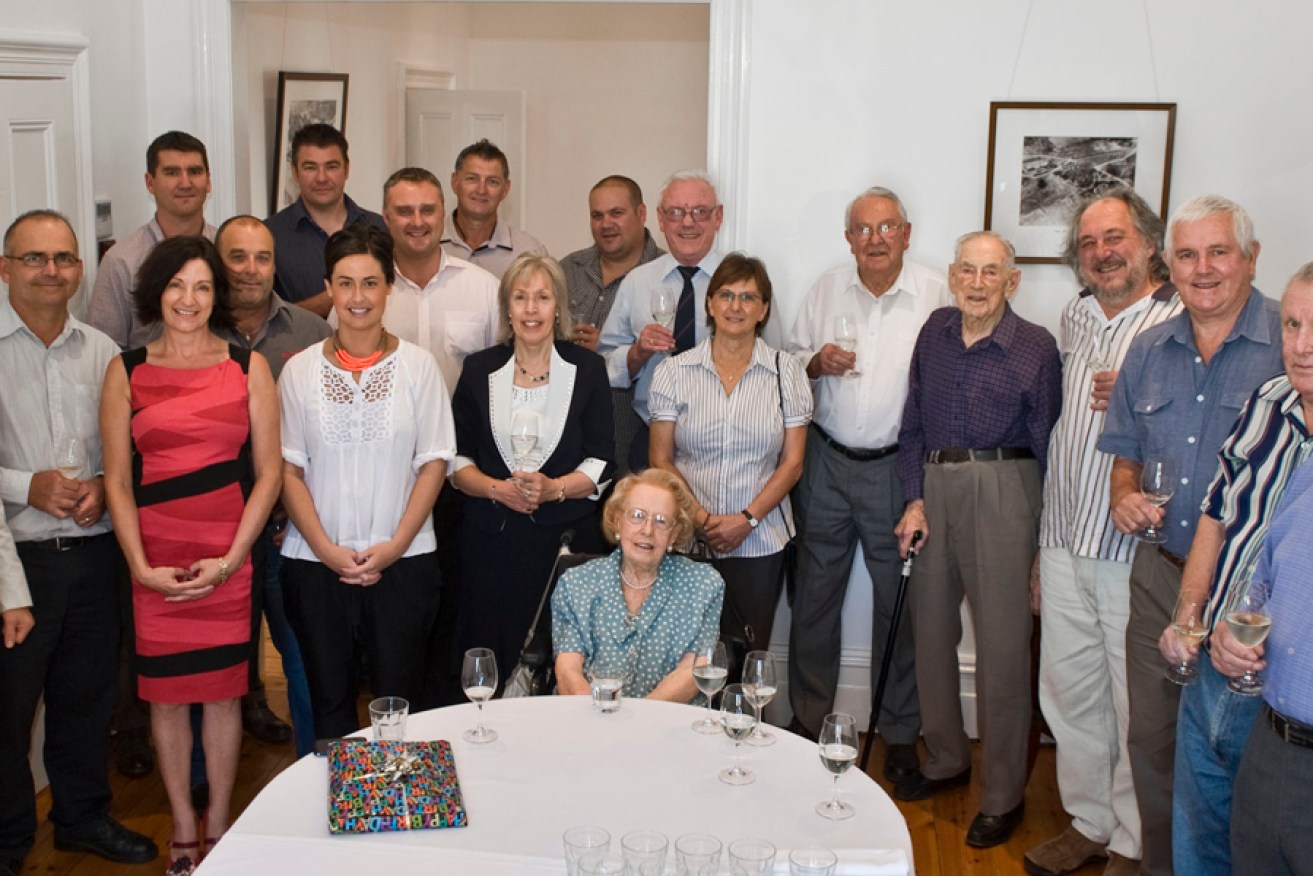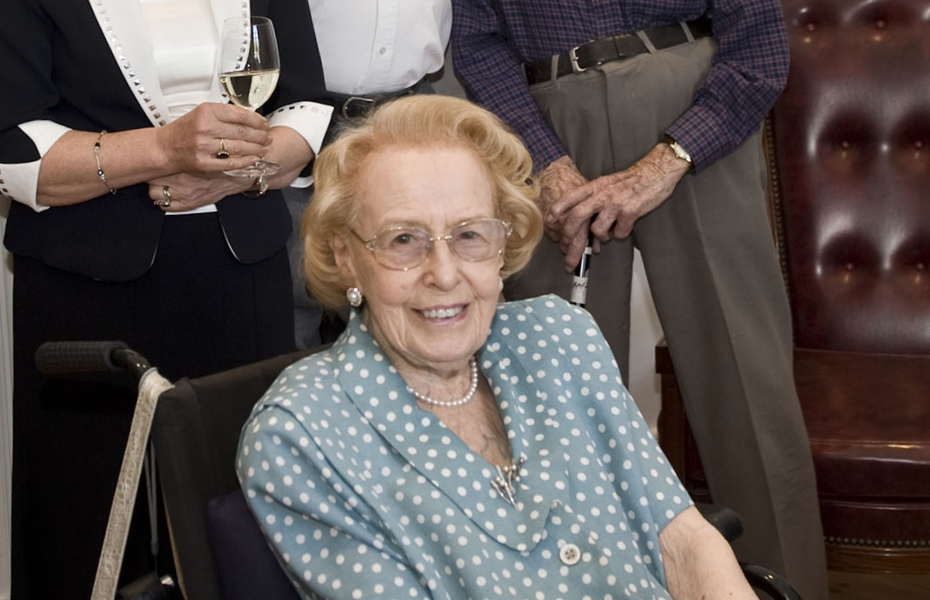Vale Thelma Schubert


Thelma Schubert, center, with the innermost of the Penfolds winemaking and management team, past and present, at Dr Ray Beckwith's 100th birthday lunch, Kalimna Homestead, Barossa, February 2012. Photo: Richard Humphrys
Another significant connection to Australia’s pre-war wine heritage has broken with the death on June 14 of Thelma ‘Thellie’ Schubert. Thelma was 95 years old.
She knew what life was like as a wine widow for decades before the death of her famous husband, Max, in 1994.
Like all modern winemakers, Max spent a lot of time on the road. Vintage involved long non-stop drives to Dalwood in the Upper Hunter, endless nights at the Nuriootpa winery or in Penfolds’ Murray Valley or Coonawarra vineyards, and exhausting stretches on the sales and promotional trail, wearing the shoeleather.
Always at home raising their two children, Sandie and Brentyn, Thelma accepted this. She was Max’s ground crew.
“I was born in 1952,” their daughter Sandie Coff said in her eulogy, “and Mum was often sole parent throughout Dad’s trips, which went for several months at a time, and throughout his career for several days in many weeks of the year.
“Amazingly, Mum never complained about being alone … even after Dad died.”
Thelma Humphrys was born in 1920 at Kooringal, near Burra in South Australia’s mid-north. After sister Viva she was the second child of Maude and Clem Humphrys. They lived together with her grandparents at their venerable homestead at Hanson, out on the grain flats between Clare and the Bald Hills of Burra – country not dissimilar to that of Moculta, where Max, the son of a blacksmith, was born and raised.
In her childhood Thelma’s family moved to Rose Park and then to Uraidla. She was joined by two sisters, Dorothy and Laurel, and a brother, Arnold. They remained close throughout their lives and the many cousins they raised were big on family get-togethers at lunches, picnics and parties.
Thelma’s memories of Uraidla and Summertown were of cold fingers and aching backs in the strawberry fields, fog, the long horse ride back and forth to school and her father coasting down the treacherous Greenhill Road with the motor off to save petrol during the Depression.
“If someone had said to Mum 30 years ago that she’d live to 95, she would never have believed them,” Sandie said. “She was amazed she’d lived longer than her own mother, who died at 71.
“Mum was labelled ‘delicate’ when she was a child, due I think to her fainting easily, and she always considered she was not as robust and energetic as her other three sisters.
“But when I took Mum to a new GP a couple of years ago, the doctor examined her and said: ‘Thelma you’re not delicate – you’re tough!’”
Having completed her schooling, Thelma studied business management before taking a job in the office at Harris Scarfe’s department store.
Around this time her family moved down from the hills, to a house on Penfold Road.
“Then she got a job in the office at Penfolds,” Sandie continued. “It was there she met the young Barossa-born apprentice winemaker, Max Schubert. Dad told the story of their first date when he went to pick her up and had to endure her sisters peeking at him, whispering and giggling.
“Obviously he persisted,” Sandie explained, “despite going off to the war for three years before they married … I don’t know how Mum’s generation got through those times … Dad would visit Mum on his army leave and she’d say goodbye not knowing if it was for the last time.”
In joining the army, Max had defied the fierce order of Penfolds managing director, Frank Penfold Hyland, who threatened to sack any worker who went to war. But Max was very aware of his family’s Silesian status, and the way Australia had imprisoned similar ‘Germans’ during the World War I.
“I volunteered for service,” he would say, “to prove I was 100 per cent Australian … I learned there was absolutely no bloody future in wars.”
While Thelma worked in the office at Penfolds Grange at Magill, Max was learning his cruel lesson at the other end of the earth. After surviving terrible action in North Africa, he served in Greece, Crete, the Middle East and Ceylon.
“Mum got six days notice that Dad had the leave to enable them to marry in 1944,” Sandie said. “Somehow the wedding was pulled together in that time and they honeymooned in Port Lincoln before he had to return to the qar.
“That parting must have been excruciating.”
Max was sent off to the New Guinea jungle campaign to stop the the Japanese invasion of Australia. Before their surrender in 1945, he contracted malaria. He came home exhausted and ill to Thelma, and returned to work, to find himself demoted to lab assistant.
They were tough days, but these were tough people. They lived in a two-storey share house on Port Road. Thelma stopped working, as was the custom for freshly-married women. The stylish country girl in her hated that loud and grimy place, and as her infant son Brentyn started escaping to make solo expeditions across the vast expanse of traffic, she reached the end of her tether.
Penfolds’ attempt to move their great wine scientist Dr Ray Beckwith from Nuriootpa to take the chief winemaker’s role at The Grange at Magill changed things for the better for Thelma and Max. Ray preferred to stay in his beloved Barossa laboratory to do science. He convinced Jeffrey Penfold Hyland to give the job instead to the delighted Schubert.
“Penfolds offered Mum and Dad a company house on Penfold Road,” Sandie recalled, “but they’d seen a house nearby on Romalo Avenue that Mum fell in love with. She would regard it as ‘such a pretty house surrounded by landscaped gardens and paddocks, gum trees, birds and fresh air’, all just a short walk from Penfolds through the widespread vineyards.”
A great place to raise kids.
Thelma was always grateful for Jeffrey Penfold Hyland’s assistance in moving her there with three-year-old Brentyn while Max was off on his legendary fact-finding mission in Europe in 1950. He came home buzzing with the Grange recipe in his head, settled in with his beloved wife, and went to work.
“This was the house they bought and lived in thereafter and Mum thankfully never had to leave,” Sandie said.
Max loved it, too. His constant travelling convinced him the prettiest lights on Earth were those he’d see flying into Adelaide, and he frustrated his young family by insisting that the best place to spend the holidays was at home.
The next decades must have been as thrilling and scary a ride for Thelma as they were for Max as he pursued his Grange dream and steadily built the Penfolds brand. She was always ready to mix with and entertain international clients and customers, and she loved the carefree sherry-sipping days aboard Jeffrey and Margaret Penfold Hyland’s yacht. They were close.
As they were to Governor Sir Donald and Lady Dunstan in the decade in which Max was in charge of the South Australian gubernatorial cellar. Max would confide, in his quiet chuckle, that not much spitting took place when the four of them sat back to examine his recommendations.
Thelma was always an accomplished social networker, loving her long phone calls with her girlfriends and relatives, her two children and her grandchildren; always excited about the next Christmas or the beach holidays, and her regular G&T giggles watching The Football Show with neighbour Shirley Rossiter.
While her kids grew, playing in the vineyards, she became a good knitter and seamstress. Sandie recalls cajoling her into crocheting a bikini for her. Once the kids had grown up and gone, she took up china-painting – she was good – and yoga. Thelma loved beautifully-carved antique furniture that reminded her of her grandparents’ place. Yet her home was a study in elegant, almost understated decor.
It is a beautiful little house.
Max eventually got to show his beloved some of the world he knew on their extended 1974 world trip; on another occasion, Thelma coaxed him into catching a ship – he’d had enough of those in the war – to visit Japan, home of the enemy he’d been sent to stop in the jungle.
They had much fun together, living it up in style, happily accepting the generous hospitality of the best of the wine world.
After Max’s death, Thelma had increasing trouble with her ageing bones – in her last 13 years she endured broken hips, spine fractures and a broken leg. But true to her form, she retained her poise and calm dignity, dressing beautifully with a sculptured coiffure, ever-ready for a dainty sip of something delicious, and delighted to be included in any type of wine world conversation.
Thelma was always interested.
“We are so grateful Mum was taken quickly and painlessly,” Sandie said, “while still being able to live at her home, and knowing her children and grandchildren were well and happy.
“She never complained about her disabilities, apart from being slow, and she remained in remarkably good spirits and kept her sense of humour. Her focus always remained on her family – particularly her grandchildren, who she adored.”
Thelma was a true beauty through and through. She was always a delight.
And yes, sadly, another of our learned links to the pre-war wine world is broken.
Thelma Schubert, 21/4/20 – 14/6/15, is survived by her son Brentyn, daughter Sandie, and grandchildren Alicia, Cassie, Lorien and Brittany.






